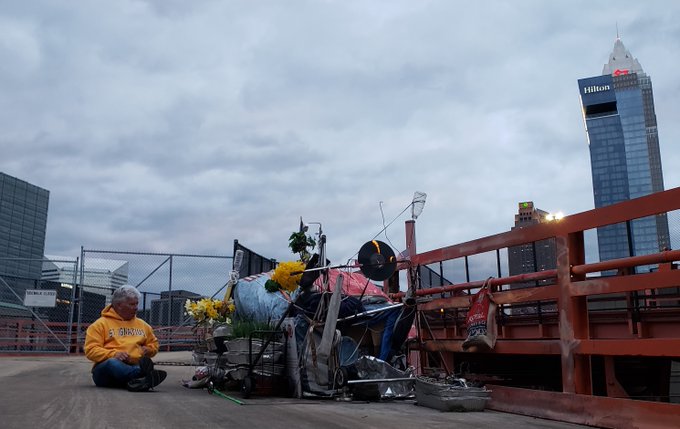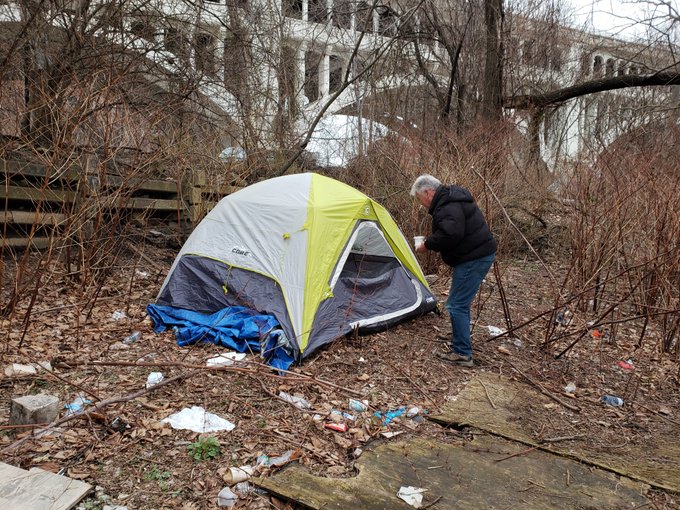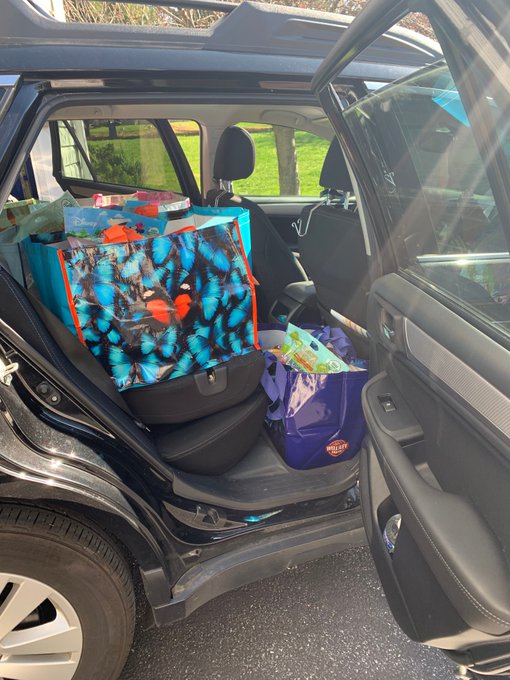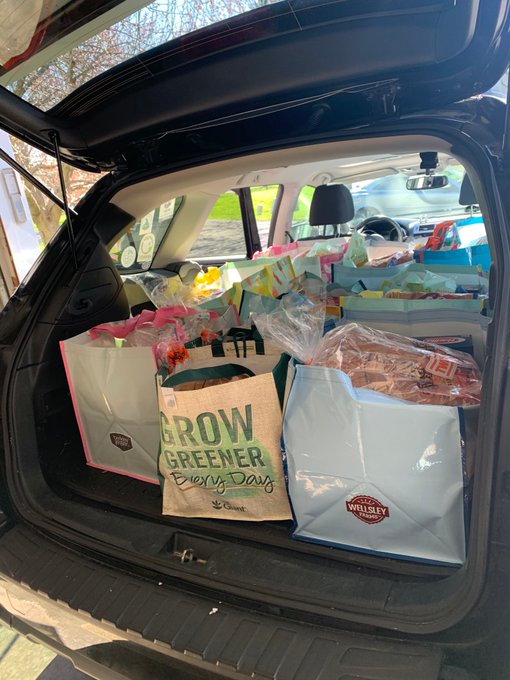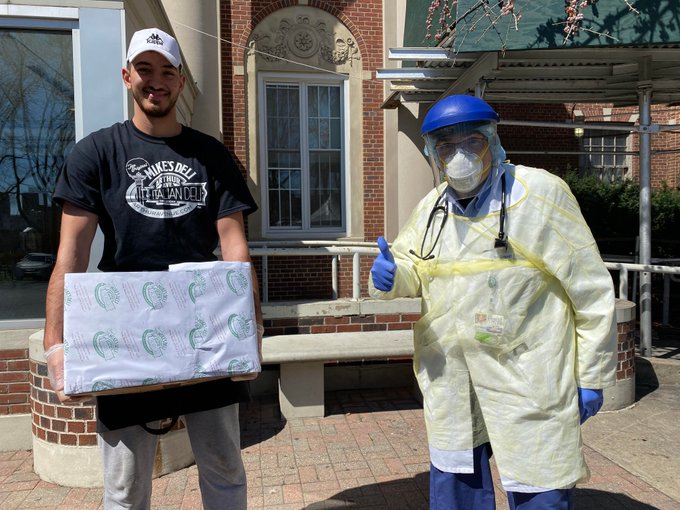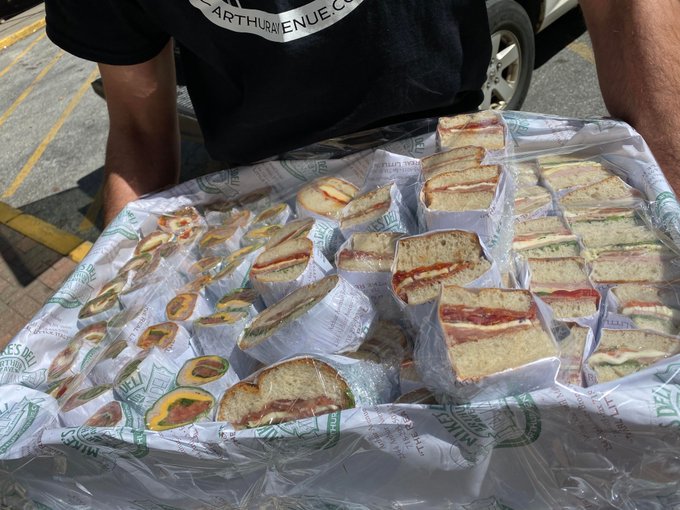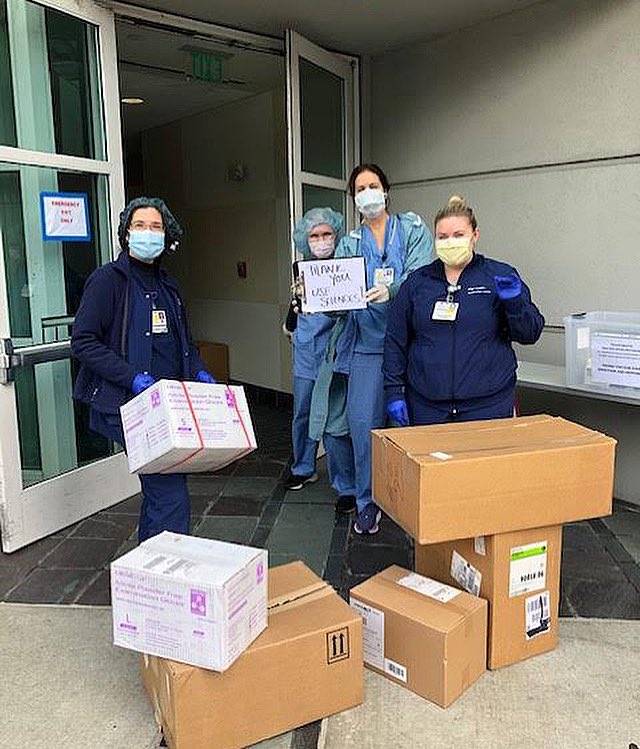By MegAnne Liebsch and Doris Sump
April 23, 2020 — “There is something which lies at the very center of the Ignatian spirit, and which enables us to renew ourselves ceaselessly and thus to adapt ourselves to new situations as they arise,” Fr. Pedro Arrupe, SJ, the 28th Superior General of the Society of Jesus, once said. “What is this something? It is the spirit of constantly seeking the will of God.”
This excerpt from Arrupe’s 1973 “Men and Women for Others” speech rings especially true in the time of coronavirus. Ignatian spirituality encourages us to find God in all things and it urges us to adapt and respond with compassion. Across the world, Jesuit-affiliated ministries, parishes, schools and individuals have done just that — adapt and respond.
Schools organized meal deliveries for families in need. Ministries coordinated temporary housing for those without homes. Universities are reimagining service programs with virtual tools.
Dr. Anthony Fauci, director of the National Institute of Allergy and Infectious Diseases whose scientific direction has guided the U.S. through much of this health crisis, is Jesuit-educated. “Knowledge goes hand-in-hand with truth — something I learned with a bit of tough love from my Jesuit education first at Regis High School in New York City and then at Holy Cross College in Worcester, Massachusetts,” Fauci wrote in 2005. “I believe that as a physician my goal is to serve humankind. I must continually thirst for knowledge, accept nothing short of excellence and know that the good of the global society is more important and larger than I am.”
In many ways, Fauci’s leadership exemplifies Arrupe’s vision of a person “for others.” But for each of the rest of us, what does it mean to be a person “for others,” especially in a time of isolation and disconnection? According to Arrupe, Ignatian teaching calls us to use our talents and intelligence to give of ourselves in love, to be “agents of change.”
Through social media, videos and photographs, emails and phone calls, the Jesuit network has shared with us how they are embodying this spirit of love and action during this pandemic.
“Reduce privilege in favor of the underprivileged”
Being an agent of change, Arrupe says, means marshaling our privilege to help those cast aside by society. Under normal circumstances, people without permanent housing are frequently overlooked and underprivileged, but in this pandemic, homeless people are especially vulnerable. They cannot shelter-in-place, and with many homeless shelters closed or operating with shortened hours, they lack access to showers and hygiene resources.
That’s why Bellarmine Preparatory School partnered with local homeless shelter Tacoma Rescue Mission, transforming their school gym into a temporary shelter for 50 homeless men. As coronavirus spread through Washington state, Tacoma Rescue Mission, which often sleeps as many as 200 people a night, grew concerned about the safety of its guests and the ability to promote social distancing. But with Bellarmine’s gym, the Mission can now follow social distancing guidelines and care for people who are especially at risk due to age and poor health.
Likewise, Ignatius Jesuit Centre in Guelph, Canada, has reimagined its tranquil retreat center and farm as an isolation shelter for homeless people suffering from COVID-19. Working with the Drop-In Centre and Wellington County public health officials, the Loyola House Retreat Centre will now welcome people receiving treatment for the disease and ensure they have a place to stay during their self-isolation.
In Detroit, the Pope Francis Center has completely reconfigured its ministry, setting up outdoor tents for meal services and 24-7 mobile showers to protect homeless and low-income guests.
The showers are here!
Posted by The Pope Francis Center on Tuesday, April 7, 2020
“He identifies himself with the poor and the powerless, with all who are hungry and miserable”
With millions of Americans unsure of where their next meal will come from, the work of Jesuit soup kitchens and food cupboards is increasingly essential in this pandemic. Many ministries have expanded their efforts despite volunteer shortages and social distancing measures.
The Guadalupe Homeless Project, run out of Dolores Mission Parish in Los Angeles, now serves an additional 500 meals a week to meet a growing number of guests. Over 40 homeless men are sheltered in place at the church. As many of their meal service and shelter guests are undocumented, the staff is increasingly concerned about health protections as many guests cannot afford medical treatment or refuse health care out of fear of ICE enforcement.
In Cleveland, the Labre Homeless Outreach at Saint Ignatius High School continues to deliver over 100 meals on Sundays with just two volunteers. For the program’s coordinator, Connor Walters, the situation is simple. “Someone has to go,” he says.
Labre Homeless Outreach at @StIgnatius continues to deliver meals to people in need around Cleveland. Volunteer Pat Manning & coordinator Connor Walsh shared over 100 meals & conversations last Sunday. Learn more: https://www.ignatius.edu/faith-in-action/christian-action-team/labre-ministry-to-the-homeless …#MenAndWomenForOthers @jesuitnews
Despite quarantines, some Jesuit works have formed deeper connections, expressing solidarity with the poor and powerless. Loyola High School students, for example, used their video editing skills to bring awareness to the need for hygiene and food supplies at The Center at Blessed Sacrament, which is a Jesuit homelessness ministry in Los Angeles.
For many people living in poverty, access to health care and health insurance is limited, which makes the coronavirus especially terrifying. This prompted a community doctor and St. John’s Jesuit High School alum, Richard Paat, to expand his clinic hours, providing free care “to assist the increased number of unemployed and uninsured in the Toledo area.”
“Love of God, in the Christian view, fuses with love of neighbor”
Social change starts with local communities. According to Arrupe, love of God is love of neighbor — both near and far. Now more than ever, people are seeking connection with their communities, reaching out to their neighbors with love and compassion.
Because many families depend on schools for daily meals, Jesuit schools like St. Andrew Nativity, St. Ignatius Academy and Cristo Rey San Jose have organized food drives and deliveries to ensure families won’t go hungry.
Delivering grocery care packages to students and families #AcademyAwesome #MenAndWomenForOthers @JesuitJustice @jesuitnews
Fordham Prep is proud to launch our Lunch for Life Program in partnership with Mike’s Deli of Arthur Avenue to benefit the Emergency Department at St. Barnabas Hospital. For more details and to make your donation, visit https://www.fordhamprep.org/lunchforlife #AMDG #LunchforLife #JSNews
In a Kohl’s parking lot in suburban Connecticut, Fairfield Prep student Ethan Dubrosky runs a contactless food drive. He collects canned and fresh food, sterilizes the packaging and then meets families in the parking lot for distribution.
When quarantines in Canada began, Our Lady of Lourdes Parish in Toronto worried about its at-risk parishioners, so they set up a phone tree to connect vulnerable and elderly parishioners to other churchgoers. For both volunteers and participants, this tele-friendship has uplifted their spirits.
For people quarantined in hospitals with no in-person visits, virtual connection with loved ones is especially important. Boston College High, along with several other area Catholic schools, organized an iPad collection drive, donating functioning iPads to patients at Tufts University Hospital so that they could FaceTime their families.
.@BCHigh along with several Catholic schools are collecting iPads to donate to @TuftsMedicalCtr patients, so they can connect with their loved ones while in isolation. #MenAndWomenForOthers@jesuitnews
Learn how you can help: https://ow.ly/YNmH50zeQWg
Many Jesuit-educated communities have also sprung into action to address medical equipment shortages, organizing collections and deliveries to local hospitals. Others have taken up sewing, creating handmade masks for health care workers.
With the MSC labs sitting idle during distance-learning, Prep’s science department decided to put their stockpile of safety goggles and gloves to their best possible use.
https://bit.ly/2WD3XQ2 #ForAndWithOthers
USF is donating much-needed personal protection equipment (PPE) to local hospitals in San Francisco that are caring for COVID-19 patients. Pictured are @UCSFHospitals staff receiving PPE donated by USF science faculty and staff.
USF News link: https://bit.ly/33K3Qnz
Today, #LOYNO professors Dr. C.J. Stephenson and Dr. Elin Grissom collected equipment from campus and donated 30K lab-quality latex gloves, 300 disposable gowns, 500 face masks, 300 sets of shoe covers, and three face shields to Tulane Medical Center! #HeartOfThePack #COVID19
“Dismantling of unjust social structures”
Justice and charity go hand-in-hand, Arrupe reminded us. He believed deeply in the power of love and that our love for our neighbors impels us to dismantle unjust social structures. As coronavirus sweeps the world, it’s upended our plans and routines, stirred the depths of our anxiety, and tested the extent to which we surrender our trust to God.
But most of all, it has exposed the deep inequalities in our society. Chronic injustices in our social, political and economic structures have made many communities more vulnerable to the effects of this pandemic.
As we go forward in our efforts to walk in solidarity with the vulnerable, we must also seek justice and equity, from the top down. Pope Francis, for example, has called for the consideration of a universal wage in response to the coronavirus, which he says “would acknowledge and dignify the noble, essential tasks” carried out by low-wage workers. “It would ensure and concretely achieve the ideal, at once so human and so Christian, of no worker without rights,” Francis wrote.
Jesuit organizations, including the Office of Justice and Ecology and the Ignatian Solidarity Network, continue to collaborate on advocacy efforts. Through our recent campaign to promote protection of the vulnerable in Congress COVID-19 relief packages, hundreds of advocates have written and called their representatives, urging legislation to support migrants, refugees, low-wage workers and many others. Learn more here. For more inspiration, check out the Ignatian Solidarity Network’s virtual events and advocacy toolkits.
We leave you with these ways to get involved and take action because, as Arrupe said, “To be just, it is not enough to refrain from injustice. One must go further and refuse to play its game, substituting love for self-interest as the driving force of society.”



